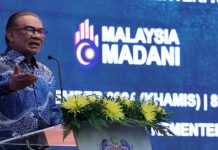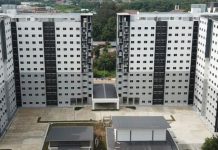Highlights:
- Two Committee to be set up to reduce fiscal deficit
- Malaysia-Singapore economic relationship is good
- Conclusion for Regional Comprehensive Economic Partnership in sight
- DHL eCommerce goes green in Malaysia and Vietnam
- UPS strengthening Asia operations
Government to set up 2 committees to reduce fiscal deficit
Finance Minister, Lim Guan Eng said the government would set up two committees to help reduce the country’s fiscal deficit to 2.8 per cent of the Gross Domestic Product. He said the Public Finance Committee and the Tax Reform Committee was also part of the continuous fiscal consolidation agenda without undermining the economic growth and prosperity of the people. Lim, who chaired the first focus group discussion yesterday among the topics discussed were ways to diversify government revenues, optimise government spending and rationalise the debt and liabilities of the Federal Government which has soared to RM1.087 trillion due to irregularities and weakness of governance in the previous government. Lim said the Public Finance Committee would provide a medium-term fiscal plan, while pursuing a fiscal consolidation agenda by taking into account the government’s needs to improve the well-being of the people and support economic growth through its expenditure. He said the committee would be chaired by him. Members include Economic Affairs Minister Datuk Seri Mohamed Azmin Ali and Bank Negara Malaysia Governor Datuk Nor Shamsiah Yunus. Lim said that the Tax Reform Committee would review the overall tax system to make it more efficient, neutral and progressive to help spur high-quality economic growth without burdening the people. “Among the measures to be taken are ways to minimise tax leakages and evasion,” he said.
Malaysia-Singapore economic relationship is good
Malaysia’s International Trade and Industry Minister Darell Leiking described the economic relations between Malaysia and Singapore as “good”. He noted that the 1962 Water Agreement and High-Speed Rail (HSR) issues would unlikely affect the long-standing relations. “The trust and closeness between us have always been there. Singapore is very aware Malaysia is going through a tough time. We have fiscal mismanagement,” he said to Bernama on the sidelines of the 50th ASEAN Economic Ministers’ (AEM) Meeting and Related Meetings in Singapore.
Speaking at the opening of the AEM, Singapore Prime Minister Lee Hsien Loong said negotiations for the Regional Comprehensive Economic Partnership (RCEP) have reached a “critical stage” and a conclusion is “finally in sight”. He said, when inked, the RCEP will form the world’s largest trading bloc that covers a third of the world’s gross domestic product (GDP). Singapore is the current chair of the Association of Southeast Asian Nations (ASEAN). Mr Lee said strengthening regional economic cooperation and integration is key for ASEAN to fully realise its potential. This includes pressing on with the implementation of the ASEAN Economic Community (AEC) Blueprint 2025, as well as supporting an open and inclusive multilateral system amid growing trade conflict.
DHL eCommerce goes green in Malaysia and Vietnam
DHL eCommerce has rolled out a fleet of electric vehicles in Malaysia and Vietnam as part of its domestic delivery network and in line with the Group’s commitment to Zero Emissions by 2050. As part of the commitment to reduce all logistics-related emissions to nett zero by the year 2050, DPDHL announced that it will operate 70% of its own first and last mile services with clean pick-up and delivery solutions. “In parallel with the continued growth in e-commerce, we expect a strong demand for deliveries and we recognize the need for sustainable delivery solutions. As part of DPDHL’s commitment to Zero Emissions by 2050, our fleet of electric vehicles will provide greener deliveries and we are committed to steadily and consciously increasing our fleet of electric vehicles in our domestic delivery network.” said Kiattichai Pitpreecha, Managing Director, Southeast Asia, DHL eCommerce. The first fleet of electric vehicles are already in use and the plan is to increase the fleet gradually by sun setting older vehicles and prioritizing ‘green and clean’ approaches. Delivery hubs in Puchong and Cheras in Malaysia and Ho Chi Minh and Hanoi in Vietnam will be retrofitted with electric charging points with fast charging capabilities.
UPS strengthening Asia operations to help businesses capitalise on regional opportunity
UPS today announced a series of network enhancements implemented across Asia, following strong companywide growth in the first half of 2018. The news also comes on the heels of the International Monetary Fund’s recent global economic outlook that anticipates Asia to maintain its robust performance with growth at 6.5 percent in 2018-20191. “The global economy is now a much bigger playing field and far less hierarchical than in the past. Shifting geopolitical forces, free trade agreements and a surge in connectivity through new technologies and physical infrastructure have allowed businesses from practically every market, including those in Asia, to take their products and services to customers anywhere in the world,” said Ross McCullough, President, UPS Asia Pacific Region. “By making investments in our Smart Logistics Network in Asia, we aim to lay the foundation for more Asian businesses to expand their reach internationally, especially to other markets within our region as increased intra-Asia trade offers a buffer against headwinds from global trade and policy uncertainties.”














